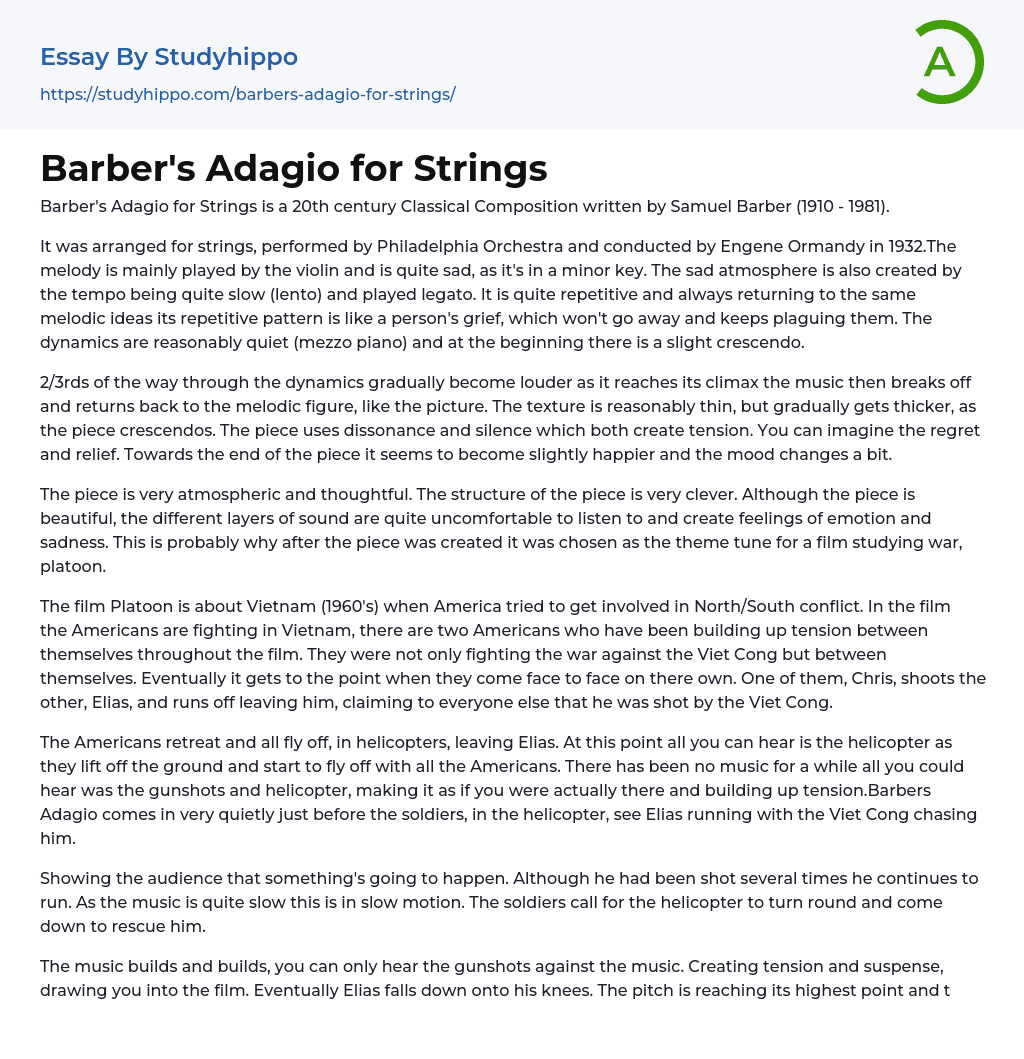Barber's Adagio for Strings is a 20th century Classical Composition written by Samuel Barber (1910 - 1981).
It was arranged for strings, performed by Philadelphia Orchestra and conducted by Engene Ormandy in 1932.The melody is mainly played by the violin and is quite sad, as it's in a minor key. The sad atmosphere is also created by the tempo being quite slow (lento) and played legato. It is quite repetitive and always returning to the same melodic ideas its repetitive pattern is like a person's grief, which won't go away and keeps plaguing them. The dynamics are reasonably quiet (mezzo piano) and at the beginning there is a slight crescendo.
2/3rds of the way through the dynamics gradually become louder as it reaches its climax the music then breaks off and returns back to the melodic figure, lik
...e the picture. The texture is reasonably thin, but gradually gets thicker, as the piece crescendos. The piece uses dissonance and silence which both create tension. You can imagine the regret and relief. Towards the end of the piece it seems to become slightly happier and the mood changes a bit.
The piece is very atmospheric and thoughtful. The structure of the piece is very clever. Although the piece is beautiful, the different layers of sound are quite uncomfortable to listen to and create feelings of emotion and sadness. This is probably why after the piece was created it was chosen as the theme tune for a film studying war, platoon.
The film Platoon is about Vietnam (1960's) when America tried to get involved in North/South conflict. In the film the Americans are fighting in Vietnam, there are two
Americans who have been building up tension between themselves throughout the film. They were not only fighting the war against the Viet Cong but between themselves. Eventually it gets to the point when they come face to face on there own. One of them, Chris, shoots the other, Elias, and runs off leaving him, claiming to everyone else that he was shot by the Viet Cong.
The Americans retreat and all fly off, in helicopters, leaving Elias. At this point all you can hear is the helicopter as they lift off the ground and start to fly off with all the Americans. There has been no music for a while all you could hear was the gunshots and helicopter, making it as if you were actually there and building up tension.Barbers Adagio comes in very quietly just before the soldiers, in the helicopter, see Elias running with the Viet Cong chasing him.
Showing the audience that something's going to happen. Although he had been shot several times he continues to run. As the music is quite slow this is in slow motion. The soldiers call for the helicopter to turn round and come down to rescue him.
The music builds and builds, you can only hear the gunshots against the music. Creating tension and suspense, drawing you into the film. Eventually Elias falls down onto his knees. The pitch is reaching its highest point and the dynamics are at their loudest (ff- fortissimo). The highest note is when Elias reaches up and throws his hands in the air. This could represent him begging for help or giving his soul to heaven.
The music ends on
a high sorrowful note as the realisation kicks in of an unnecessary death. The piece does not play all the way through. This is probably because as it moves towards the end the music becomes slightly happier. The writer of the film does not want to create a happy atmosphere yet, so they leave it at a sad, high pitched note.Music is crucial in films. This piece of music would not have the same depth, be as powerful or have the same effect without Barber's Adagio.
Although classical music may seem strange to accompany a war film it worked really well, it strengthens the message and helps re-enact it. The music helped set the mood, tempo and tone of the film.This is not the only war-related programme that Barber's Adagio has been used for. It has helped to create the image of war and suffering to a special 9/11 documentary. Barber's Adagio was used to accompany images of the twin towers before and after.
It helps explain how desperate these people who lost their lives were. These pictures would have been nowhere near as effective if they hadn't been accompanied by the music. People remember this and so on the last night of the proms, in the Albert Hall and in places all around the country, they sang this to remember everyone who had lost there lives on 9/11. The atmosphere was incredible and Barber's Adagio brought emotion to everyone.Again this shows how this piece of music creates emotions and feelings, it helps explain suffering and trauma. It is hard not to think of sadness and remember memories of losses, pain and grief when you
hear it.
The piece is so effective in being so beautiful yet so uncomfortable.
- Band essays
- Baroque Music essays
- Blues essays
- Classical Concert essays
- Classical Music essays
- Concert essays
- Hip Hop essays
- Jazz essays
- Ludwig Van Beethoven essays
- Michael Jackson essays
- Mp3 essays
- Music Concert Report essays
- Music Reference essays
- Music video essays
- Musical Instruments essays
- Opera essays
- Piano essays
- Popular music essays
- Recording essays
- Rock And Roll essays
- Rock Music essays
- Singing essays
- Sonata essays
- Song essays
- Sonnet essays
- Tupac shakur essays
- Atom essays
- Big Bang Theory essays
- Density essays
- Electricity essays
- Energy essays
- Force essays
- Heat essays
- Light essays
- Motion essays
- Nuclear Power essays
- Physiology essays
- Sound essays
- Speed essays
- Temperature essays
- Thermodynamics essays




